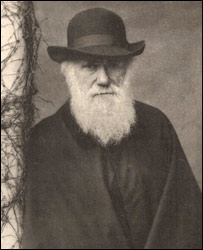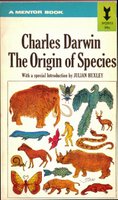Darwin online
 When I was in junior high school I coughed up 95 cents and bought a paperback copy of Darwin's "Origin of Species". My science teacher, Mrs. Bagley, saw me reading it one day in study hall and gasped. She accused me of being an atheist and forced me to debate James Poole, a classmate and ardent student of the Bible (honest to ---).
When I was in junior high school I coughed up 95 cents and bought a paperback copy of Darwin's "Origin of Species". My science teacher, Mrs. Bagley, saw me reading it one day in study hall and gasped. She accused me of being an atheist and forced me to debate James Poole, a classmate and ardent student of the Bible (honest to ---).Needless to say, this was all very confusing. I couldn't figure out why was my science teacher upset that I was reading a book about science. At any rate, we did debate -- a mini version of the Scopes "Monkey Trial" at Rawlings Jr. High School in Cleveland Ohio.

I can't remember if a winner was declared, and can't imagine anything like that ever happening in a public school in this day and age -- just think of the potential lawsuits. But if it did, one could save at least 95 cents since all of Darwin's works are now available online. (GW)
Charles Darwin's works go online
The project run by Cambridge University has digitised some 50,000 pages of text and 40,000 images of original publications - all of it searchable.
Surfers can even access downloadable audio files to use on MP3 players.
The resource is aimed at serious scholars, but can be used by anyone with an interest in Darwin and his theory on the evolution of life.
"The idea is to make these important works as accessible as possible; some people can only get at Darwin that way," said Dr John van Wyhe, the project's director.
One big collection
Dr van Wyhe has spent the past four years searching the globe for copies of Darwin's own materials, and works written about the naturalist and his breakthrough ideas on natural selection.
The historian said he was inspired to build the library at darwin-online.org.uk when his own efforts to study Darwin while at university in Asia were frustrated.
Darwin Online features many newly transcribed or never-before-published manuscripts written by the great man.
These include a remarkable field notebook from his famous Beagle voyage to the Galapagos Islands, where detailed observations of the wildlife would later forge his scientific arguments.
Free use
The real artefact was stolen in the 1980s and is still missing, but the text has been transcribed from a microfilm copy made two decades earlier.
"It is astonishing to see the notebook that Darwin had in his pocket as he walked around the Galapagos - the scribbled notes that he took as he clambered over the lava," said Randal Keynes, the great-great-grandson of Charles Darwin.
"If people can read it on the web and they learn that it was stolen then I think there is more chance that this very important piece of national heritage is recovered," he told BBC News.
There is no charge to use the website. Most texts can be viewed either as colour originals or as fully formatted electronic transcriptions. There are also German, Danish and Russian editions.
Users can also peruse more than 150 supplementary texts, ranging from reference works to contemporary reviews of Darwin's books, obituaries and recollections.
At the moment the site contains about 50% of the materials that will be provided by 2009, the bicentenary of the naturalist's birth.
"The family has always wanted Darwin's papers and manuscripts available to anyone who wants to read them. That everyone around the world can now see them on the web is simply fantastic," said Mr Keynes.
The Complete Works of Charles Darwin Online

0 Comments:
Post a Comment
<< Home